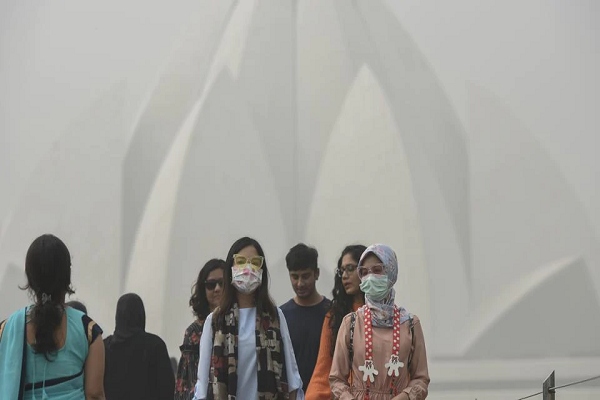
Delhi’s air quality has been touching nadir since Diwali when people brazenly defied Supreme Court’s diktat of two hour ban on bursting crackers and experts’ appeal to observe green Diwali this time.
As per the report, AQI was first hit poor category on a day-before Diwali and turned into severe category as post-crackers fumes choked city’s air. In addition, stubble burning in nearby states and climate change are ameliorating the problem.

Air pollution is posing a risk to health as several people are found complaining breathing problem. It has been linked to many diseases, respiratory and heart-related in particular. Experts are suggesting people to use mask and avoid areas with large vehicular movement. Though, people of all age are equally at risk, children are more vulnerable due to low immunity.
What precautions need to be taken to avoid health risk?
• One should avoid daily routine for morning and evening walks and make a practice to exercise only at home until the situation improves

• Office goers can’t avoid travelling. Don’t travel in open vehicles and opt for closed-transport system including metro, buses, and cars
• Get indoor plants as they act as air purifiers and increases oxygen level in the surroundings. Plants like Aloe vera, areca palm, English Ivy can minimize indoor air pollution.
• If you have children, elderly, pregnant woman or asthma patients in your house, then one should have air purifier at home
• Avoid burning garbage and prevent others in the neighborhood from doing the same
• One should eat healthy food including plenty of vegetables and fruits containing vitamin C like lemon, carrots and apples to increase the immunity
• Using air masks can limit exposure to pollutants but that need to be chosen prudently. Mask should keep you pollutants at bay.
What kind of mask should be used?
Since the major pollutants in Delhi’s air are PM 2.5 and PM 10 microns, one is advised to use mask that can filter them out. N rated masks (approved by the US government) are capable of doing so. An N95 mask filters out 95% of PM 2.5 and N99 masks can filter 99%. These are the two types of masks that can actually make a difference.
N99 and N100 masks are considered most effective masks as they can filter PM 2.5 airborne particulate matter with up to 99 to 99.97 percent efficiency. Available in various sizes, these masks can be used for a period of 5 to 6 months regularly.
N95 respirators are probably the most commonly used and affordable masks. They filter particulate matter PM 2.5 with at least 95 per cent efficiency.
Be a part of Elets Collaborative Initiatives. Join Us for Upcoming Events and explore business opportunities. Like us on Facebook , connect with us on LinkedIn and follow us on Twitter , Instagram.












